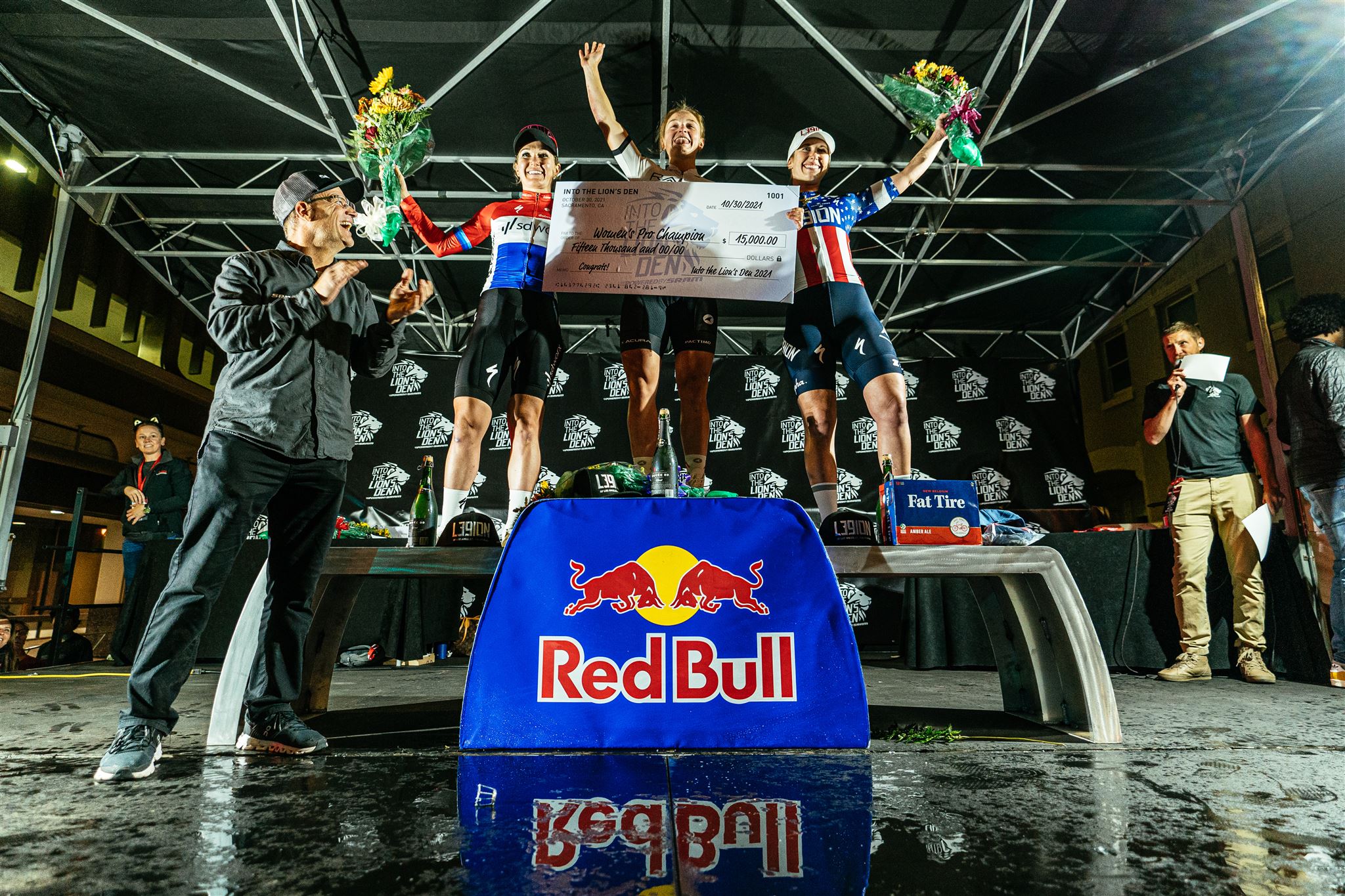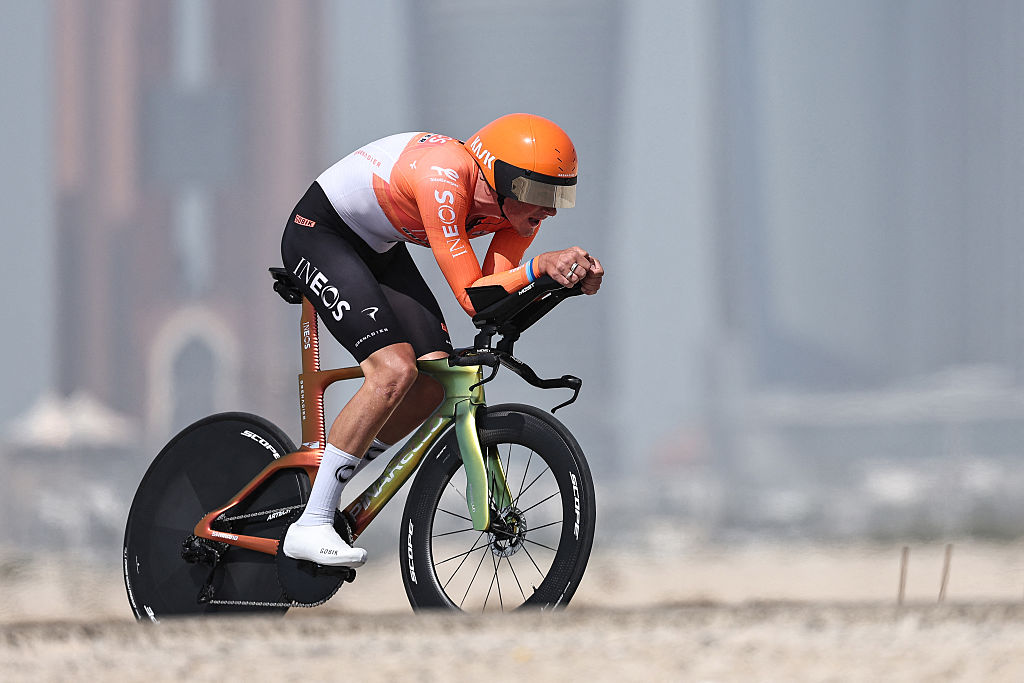Opinion: Don’t blame Olivia Ray – prize payments are a sport-wide issue
Into the Lion's Den organisers promise prompt payments but attempts to silence Ray are wrong

The latest race content, interviews, features, reviews and expert buying guides, direct to your inbox!
You are now subscribed
Your newsletter sign-up was successful
For those unfamiliar with Olivia Ray, she is the criterium national champion from New Zealand and is currently under contract to race for an American-based Continental women's team Rally Cycling. She's also known for pushing to make cycling a safer space for everyone through discussions surrounding mental health awareness and body positivity.
In October, Ray won the pro women's race at the inaugural Into The Lion's Den Criterium in Sacramento. It was a meaningful victory for her and her team.
It was also a celebration for women's cycling as a whole because organizers of the event billed as one of the richest criteriums in US history offered a $100,000 prize purse that was split equally between the men's and the women's 70-minute races, the kind of parity rarely offered in cycling.
Unequal prize money in cycling has been a point of discussion several times throughout this season, and so the promotion of equal prize money for equal work at Into The Lion's Den Criterium was a welcome and positive message that drew in a quality field.
On Tuesday, more than five weeks after the event, Ray questioned why she hadn't yet received her cheque for the winner's $15,000 prize in a post on her personal Twitter channel and in a statement provided to us at Cyclingnews.
When a rider asks when they can expect to be paid for their work, it is a fair and legitimate question. Likewise, expressing concern over the limited communication from the event organizers regarding the time frame of payments is justifiable.
However, Ray faced criticism from the sport for voicing her concerns, including derision and dismissal of her concerns, particularly through comments across social media.
The latest race content, interviews, features, reviews and expert buying guides, direct to your inbox!
Ty Magner, who races for L39ION of Los Angeles, questioned the legitimacy of Ray’s inquiry about late payments. "Lol. If you don’t like waiting a month for prize money, I suggest you don’t win any prize money in Europe. The 'UCI prize money management' loves to sit on a solid years worth of winnings," he posted on Twitter.
When another commenter requested a response from the organisers of Into The Lion’s Den regarding Ray's delayed payment and expressed concern about the lack of communication from the organisers to its participants about prize money, Magner replied, "How many times have we all waited for prize money? Patiently, like adults?"
He added that, "This shows your clear ignorance for our sport. You know how often we as riders wait for prize money in nearly every big race we do? I’ve waited for over a year for money many times. Often times the biggest events in our country, or the country the race took place."
Magner’s teammate Tyler Williams added to the discussion on social media stating, "Let them race for gift cards from now on."
He went on to suggest that Cyclingnews should "hold every race from now on accountable for paying out within 5 weeks. Still waiting on some prize money for 2016 I think," in response to our publication of Ray's concerns.
Ray deleted her initial comments on social media and made a public apology the following day.
Ray has no reason to apologize and that she was criticised for asking a valid question is unsettling. Her experience shines a light on the aspects of the sport that allow for things like coercion, intimidation and other forms of financial abuse, particularly toward those not in a position of power.
In recent years, cycling has progressed in providing better protections for athletes' rights regarding contracts and compensations, ethics, and professionalism, especially for women. All have led to a safer space that encourages athletes to speak up when something seems not right.
When a rider is not permitted to ask questions or voice concerns, it sends the sport a step backwards in its overall effort to create a professional environment and a progressive culture. It shows that the sport has more work to do in this space.
L39ION of Los Angeles is a great example of a team pushing for such positive change to advance the sport and promote diversity, inclusion, representation and nonconformity, all the things that make them one of the most inspiring teams in cycling. We should all embrace and elevate athletes who raise valid concerns about issues in the sport.
Delays in prize money payouts indeed happen all the time and in all levels of cycling events, and it's not uncommon for some payments to be delayed up to a year.
Organisers of Into The Lion’s Den Criterium have stated that all riders will be paid their prize money soon, which would be considered a quicker timeline than many other events. Just because delays in payouts happen all the time, doesn't make it OK and it’s not something that should be accepted or normalised. (KF)
Cycling has a problem delivering on promised prizes
Ray is 23 and only in her first professional season. Most of the smaller races she's done pay out their tiny prizes directly after the race. She might not be aware of the sometimes lengthy timeline for larger prize payouts, but in her naivety, she raises a valid point about an issue that has been a bone of contention for teams and riders from the grassroots level through to the top of the WorldTour for as long as the sport has had a professional component.
We can only guess at the backroom damage control that led to Ray calling her valid complaints "inexcusable and uncalled for", but one social media commenter noted: "I've been around cycling for a little while, but I have to say a rider being forced to do a hostage video confession for complaining about a late payout has genuinely shocked me. It's astonishing. It's authoritarian. It's deeply wrong."
Whatever went down behind closed doors overnight highlights exactly why the lack of prize payouts is not usually discussed openly. The delicate sponsorship model of pro cycling gives sponsors huge leverage – both those supporting events and those who fund the teams, which sometimes overlap. It places enormous pressure on riders and teams who rely on that support, even in the absence of direct threats from sponsors, to avoid negative press.
That said, there have been a few high-profile complaints about late prize payouts in pro cycling in past years, so the Into the Lion's Den organisers can take heart. The Tour de France organisers came under criticism for not promptly paying out prizes from the 2007 Tour de France, having held back over that year's multiple doping cases.
But it doesn't always take doping scandals to delay prize payments. Several editions of a now-defunct major US one-day race had prizes paid only after the next year's sponsorship cheques cleared, and some riders say they are still waiting on prizes won years ago.
Because women are still paid much less than their male counterparts, with some riders not even earning a salary, the prize money becomes even more important. But any rider expecting a five-figure cheque could be forgiven for being a bit impatient, especially with end-of-the-year bills to pay.
Added to the difficulty of a rider getting prize money is a common practice of races paying out to the teams and then relying on them to divide and distribute the cash. This has opened up room for economic abuse, where teams can withhold prizes from riders as punishment or as coercion.
The issue even became part of UCI President David Lappartient's reforms, with the Frenchman proposing to WorldTour teams in 2019 a centralised prize money management system to remove responsibility for distributing payments from teams and allowing the UCI to monitor the payments. (By some accounts, it has failed to resolve the issue.)
The organisers of the Into the Lion's Den Criterium promoted their event incredibly well with an ambitious professional marketing effort, but that intense campaign also served to hype the riders' expectations, especially with the record-setting prize purse.
However, the race was fairly opaque about who the actual organiser was and who was in charge of the payouts. The organisers' inexperience is showing amid this controversy. In the future, they would be wise to communicate with teams and riders and set expectations for payout – something typically provided in the technical guide.
But the race didn't have a technical guide and was not sanctioned by any governing body, so there is no organisation holding them accountable for living up to their promises.
And since the governing bodies who promised to fix the prize payment problems haven’t been able to effect change, it leaves the riders in a position where they have to advocate for themselves. Ironically, two of the L39ION riders – Ty Magner and Tyler Williams – have pointed to the UCI’s failures in their belittling responses to Ray.
So why should Ray accept the status quo? All she was asking for was a timeline and some reassurance from the race. She doesn't deserve the backlash she's getting.
Neither do the race organisers, ostensibly the L39ION team. They should be applauded for their ambition. Putting on a race is not easy and even the most prominent organisers don't get everything right every time. There are many moving parts and something is bound to get overlooked, but communication is key.
We hope the race organisers learn from this year's event and things go much more smoothly in the future. (LW)

Kirsten Frattini has been the Editor of Cyclingnews since December 2025, overseeing editorial operations and output across the brand and delivering quality, engaging content.
She manages global budgets, racing & events, production scheduling, and contributor commissions, collaborating across content sections and teams in the UK, Europe, North America, and Australia to ensure audience and subscription growth across the brand.
Kirsten has a background in Kinesiology and Health Science. She has been involved in cycling from the community and grassroots level to professional cycling's biggest races, reporting on the WorldTour, Spring Classics, Tours de France, World Championships and Olympic Games.
